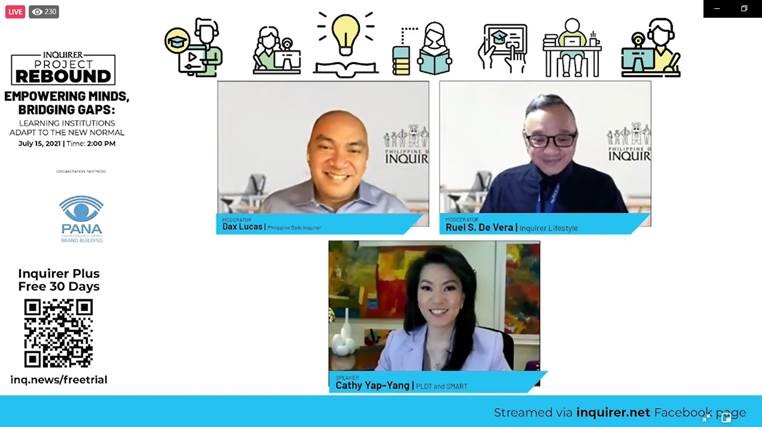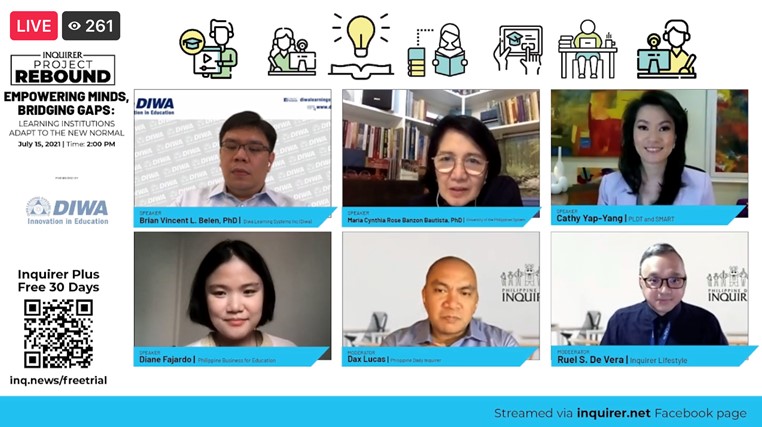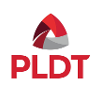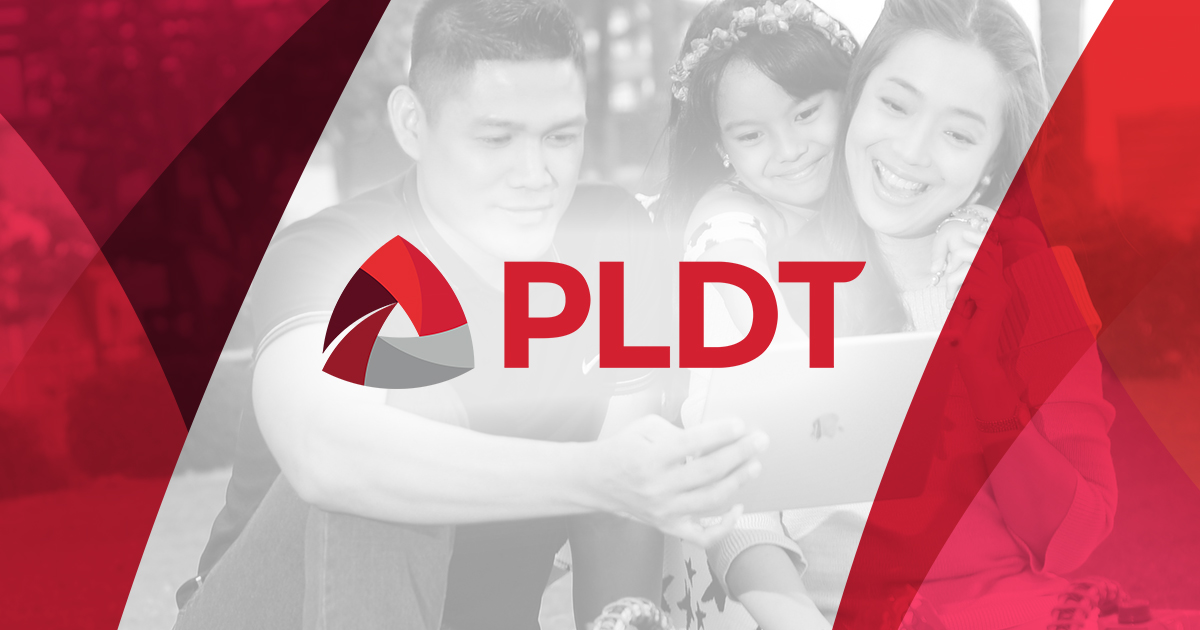

PLDT and its wireless unit Smart Communications, Inc (Smart) continue to fill the gaps in education, a year after COVID-19 fast-tracked the shift to distance learning.
For school year 2020 to 2021, the Smart-backed pandemic-resilient teaching strategy called the Central Visayan Institute Foundation-Dynamic Learning Program (CVIF-DLP) saw a 927% in adoption from across the Philippines. From an initial 73 implementing schools since 2002, there are now at least 750 formal and informal schools and learning communities that have adopted the CVIF-DLP in 2020-2021, encouraging independent learning.
“What really worked out for us is we’d been invested in independent learning way before the pandemic. We’ve had a long-standing commitment to support education and which the Department of Education recognizes,” said Catherine Yap-Yang, PLDT and Smart First Vice President and Group Head of Corporate Communications, PLDT and Smart. “So it helped that when we were ready to deploy services and solutions to help enable the entire educational ecosystem under the new normal, we had the trust and support of our stakeholders.”
Speaking at the recent forum, “Empowering Minds, Bridging Gaps” hosted by the Philippine Daily Inquirer, Yap-Yang said that while the pandemic posed challenges due to the sudden shift to online/distance learning, it also opened opportunities to improving the quality of education through independent learning.
“Suddenly, we had to enable setting up the entire ecosystem that would allow for learning continuity. The two biggest challenges have been access to devices and being able to afford connectivity for online learning. As a telco service provider, we filled that need. We invested a record amount of resources to strengthen our integrated fiber and wireless network, to provide access to connectivity. We have been actively rolling out our WiFi connectivity to more communities, as well as offering Smart GIGA Study packages for mobile phone users, giving students access to learning apps and productivity tools for e-learning. Customers of both Smart and TNT also get free access to DepEd Commons, the online learning resource portal of the Department of Education (DepEd). As for last-mile schools – or those without access to devices and connectivity, Smart has progressively deployed over 300 units of the School-in-a-Bag, a portable digital classroom that contains a laptop and Smart LTE pocket WiFi for the teacher, and 10 to 20 tablets for the students, all pre-loaded with multimedia content, accessible even offline. We complemented these with enterprise solutions for schools, including Learning Management Systems, devices, and hosting. We also conducted teacher training on ed tech and pedagogy and worked with partners to develop content.”
Smart’s most prominent success stories under the CVIF-Dynamic Learning Program (CVIF-DLP) had been the most collaborative, namely the DepEd Saragani Division for formal schools in Region 12 and DepEd Region 10 for Alternative Learning System.
DepEd’s Sarangani Division took a major step in school year 2020-2021, as it led a division-wide implementation of the CVIF-DLP, including its Indigenous Peoples learning communities. The disaster-resilient teaching strategy successfully complemented their Radio-Based Instruction (RBI) and Learning Resources (LR) on Wheels, making it a good model that can be replicated to other learning communities.
As for DepEd Region 10, early adoption of the CVIF-DLP sustained the teaching and learning processes during the pandemic for second-chance learners.
Both DepEd Regions 12 and 10 embraced CVIF-DLP in 2017 and 2011 respectively, well before the pandemic. But beyond the early adopters, the CVIF-DLP had also begun to help troubled private schools avert closure due to the pandemic.
Echelon Development School in Altavas, Aklan was on the brink of school closure a year ago, due to the COVID-19 crisis. On the week the private school was planning to announce the inevitable, administrators came across Smart’s distance learning program. They gave it a shot and adopted the CVIF-DLP. The school remains open to this day, playing an integral role in continuous learning, harnessing independent learners in its community.
What had first been implemented in 2010 to support a disaster-resilient teaching strategy is now proving to be a solution to the COVID-19 disruption. As CVIF-DLP emerges to be a key enabler for independent learning and inclusive education, there is now a greater need to tighten collaboration among stakeholders.

In the same forum, Dr. Cynthia Rose Banzon Bautista, University of the Philippines’ Vice President for Academic Affairs expressed support for distance learning. “This teaching strategy allows students to be independent learners,” she said. “The first problem then was we do not have teachers in science, therefore DLP has developed materials that have helped students learn independently. This is where our future should be.”
Meanwhile, Dr. Brian Vicente Belen, President of Diwa Learning Systems urged schools to work more closely with partners. “On the ground, schools in general need to work better with stakeholders and suppliers… There’s a lot of handholding involved for schools to be able to find the right solution for their specific situation, with the right partners and communications with stakeholders. Then it will be a lot easier for schools to implement their vision.”
Beyond connectivity, PLDT and Smart have been leverging on the MVP Group’s media unit Cignal, to air DepEdTV in two channels for, enabling inclusive education.
“We are of the view that online learning is here to stay, so we're along that path, whether we go hybrid or fully online, we’re one in innovating as needs shift,” said Yap-Yang. “One year and a half in lockdown has provided us a dry run if you will – and the focus now is on learning from experience and fine-tuning what has worked, weeding out what has not, whether it be online or modular TV-based, or radio-based. So we’re hoping to leverage on what we know now to support the evolving needs of the entire educational ecosystem and improve learning outcomes.”
Apart from the CVIF-DLP, PLDT Enterprise has been offering platforms such as Learning Management Systems, online engagement tools, and hosting. PLDT has also been conducting a series of webinars under its InfoTeach Outreach program entitled “Gearing up for the New Normal in Teaching and Learning.” In partnership with the University of the Philippines Open University (UPOU), the program trained teachers from over 29 DepEd Divisions on topics such as engaging learners online and assessment of online engagement tools. A session for parents focused on how to support their children as online learners. In its first run of its 10 webinar sessions in 2020, the program was able to reach out to over 60,000 participants. From March to May this year, another set of webinar sessions were conducted for the students, under the Phase 6 implementation of the program, with 19,873 registered learners that reached 57,631 live streaming views using the UPOU social media and web pages.
These solutions and services are backed by PLDT’s most extensive fiber infrastructure, at more than 511,000 kilometers. This also supports Smart's mobile networks, which now cover 96% of the population from Batanes to Tawi-Tawi. Smart's 5G network--the country's first, fastest and widest, now has more than 4,000 sites across the Philippines.
PLDT and Smart have been creating and supporting various educational initiatives, in line with their commitment to help the nation achieve the United Nation’s Sustainable Development Goals #4: Quality Education.


